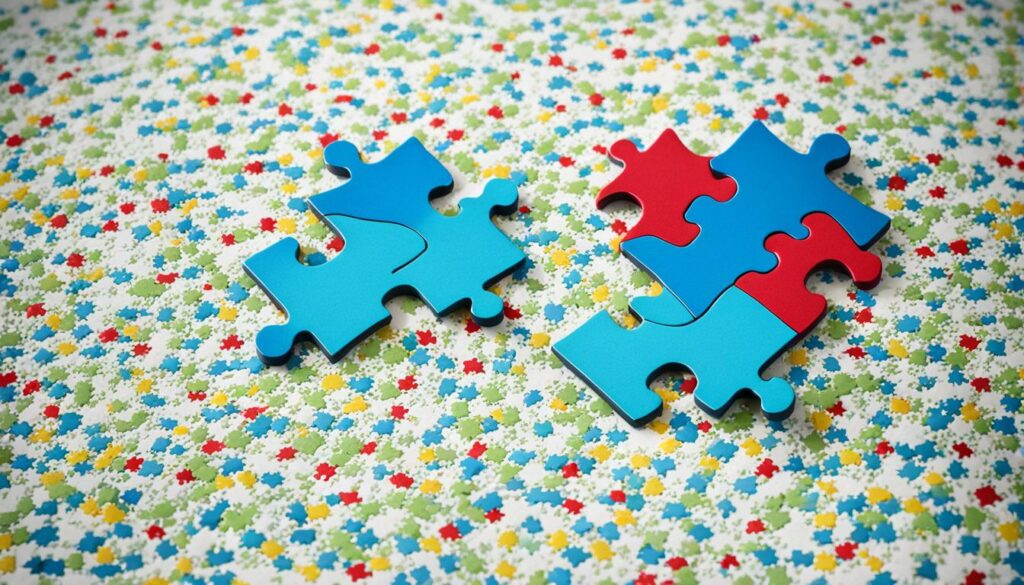“You only lose what you cling to.” – Buddha
Have you ever wondered why people fall out of love? It’s a question that plagues many individuals as they navigate the ups and downs of their relationships. The truth is, falling out of love is a complex and often painful experience that can leave one feeling lost and confused. But understanding the reasons behind this phenomenon can provide valuable insights and guidance on how to prevent it from happening.
In this article, we will explore the common signs and reasons behind falling out of love, as well as practical tips for preventing this emotional detachment. Whether you’re currently experiencing a shift in your relationship or simply want to equip yourself with the knowledge to maintain a strong and lasting love, this article offers valuable perspectives and strategies to help you navigate the challenging terrain of love and relationships.
Key Takeaways:
- Understanding the reasons behind falling out of love can help individuals prevent emotional detachment in their relationships.
- Signs of falling out of love include a lack of care, constant complaining, minimal effort, and a lack of intimacy.
- Feeling unappreciated and managing toxic thoughts are common reasons why people fall out of love.
- Incompatibility, both in values and lifestyles, can lead to the erosion of love.
- Effective communication, emotional intimacy, seeking therapy, and proactive efforts can help prevent falling out of love and rebuild the emotional connection.
Feeling Unappreciated and Undervalued
One common reason why people fall out of love is feeling unappreciated or undervalued by their partner. In the early stages of a relationship, love often feels unconditional, but over time, couples may start taking each other for granted. The stressors of daily life can get in the way of showing appreciation, giving compliments, or acknowledging caring behaviors. When respect, attention, and kindness wane, feelings of love can diminish. To prevent falling into the trap of relationship complacency, it’s important to schedule quality time together, show appreciation, and make efforts to strengthen the emotional connection.

| Lack of Appreciation and Value | Effects on Love | Preventive Measures |
|---|---|---|
| Feeling unappreciated | Diminished feelings of love | Schedule quality time together |
| Feeling undervalued | Relationship complacency | Show appreciation and gratitude |
| Taking each other for granted | Weakening emotional connection | Make efforts to strengthen the emotional connection |
| Lack of respect | Decrease in love | Express kindness and empathy |
| Lack of attention | Loss of emotional intimacy | Communicate openly and actively listen |
| Lack of kindness | Disintegration of love | Show acts of kindness and compassion |
Feeling unappreciated and undervalued can significantly impact a relationship, leading to a decline in love and emotional connection. By taking proactive steps to prevent complacency, such as scheduling quality time together, expressing appreciation and gratitude, and making efforts to strengthen the emotional connection, individuals can cultivate a sense of value and appreciation in their relationship.
Managing Toxic Thoughts
Another reason why people fall out of love is not managing toxic thoughts in their relationship. Toxic thoughts can lead to negative perceptions of your partner and harm the emotional connection between you two.
Examples of toxic thoughts include:
- All-or-nothing thinking: Seeing your partner as always wrong or never right. This black-and-white mentality can create unnecessary conflict and distance in the relationship.
- Catastrophic conclusions: Exaggerating negative actions or events, blowing them out of proportion. This can create unnecessary feelings of resentment and anger.
- The “should” bomb: Expecting your partner to meet certain needs without clear communication. Assuming that your partner should know what you need can lead to frustration and disappointment.
To overcome toxic thoughts, it’s essential to shift your mindset towards positive thinking and focus on your partner’s positive qualities. Instead of dwelling on their flaws, make a conscious effort to appreciate and acknowledge their strengths. Practice positive communication by expressing gratitude, love, and support. By maintaining a realistic and healthy perspective on the relationship, you can overcome toxic thoughts and strengthen your emotional connection with your partner.
In the next section, we will explore the topic of incompatibility, which is another common reason why people fall out of love.
Incompatibility
Research has shown that compatibility plays a crucial role in maintaining a healthy and fulfilling relationship. Couples who share similar attitudes, values, and backgrounds tend to experience lasting satisfaction, companionship, and intimacy.
However, it is not uncommon for partners to discover that their lifestyles, priorities, and values may not align perfectly. This incompatibility can gradually erode the foundation of love in a relationship. To address incompatibility, it is essential for both partners to navigate the challenges and find common ground.
Addressing Incompatibility
To foster a strong and connected relationship despite inherent differences, it is crucial to manage expectations and be flexible. Understanding that no two individuals are entirely alike and embracing each other’s uniqueness can lead to a more harmonious union.
Open and honest communication is key in addressing relationship incompatibility. By expressing your thoughts and concerns respectfully, both partners can gain a deeper understanding of each other’s perspectives. This can lay the groundwork for finding compromises and solutions that allow you to feel connected and fulfilled in the relationship.
Finding Common Interests
Finding shared hobbies and interests can help bridge the gap created by incompatibility. Exploring new activities together not only strengthens the bond between partners but also provides opportunities for personal growth and mutual understanding.
Being open-minded and willing to try new things can lead to unexpected discoveries and shared experiences that foster a sense of companionship and connection. Whether it’s taking a cooking class, going on an adventure, or exploring a new hobby, finding common ground can help create a stronger foundation for your relationship.
The Flexibility Factor
Flexibility is an essential trait when it comes to managing relationship incompatibility. Being willing to compromise and adapt to each other’s needs and preferences can help navigate challenges and keep the relationship thriving.
By being flexible, both partners can create an environment where growth and understanding flourish. Remember, love is not about being right or wrong, but about creating a safe space where both individuals can express themselves and feel valued.
| Benefits of Addressing Incompatibility | Techniques for Managing Incompatibility |
|---|---|
|
|
Addressing incompatibility is an ongoing process that requires effort and understanding from both partners. By acknowledging and appreciating each other’s differences, communicating effectively, and finding common ground, you can build a stronger and more fulfilling relationship despite any initial incompatibilities.

Signs of Falling Out of Love
It’s important to be aware of the signs that indicate a person may be falling out of love. Recognizing these signs can help individuals identify potential issues in their relationship and take proactive steps to address them. Here are some common signs to look out for:
- Lack of care or concern for their partner: When someone is falling out of love, they may start to show a lack of care or concern for their partner’s well-being. They may become indifferent or dismissive of their partner’s needs.
- Constant complaining about the partner to others: Instead of focusing on the positive aspects of their relationship, a person falling out of love may constantly complain about their partner to others. This negative attitude can undermine the emotional connection between partners.
- Staying together for comfort and stability rather than genuine love: Sometimes, couples stay together not out of genuine love, but for the sake of comfort and stability. This can create a sense of emotional detachment and hinder the growth of love.
- Minimal effort into the relationship: When someone is falling out of love, they may put minimal effort into the relationship. This can manifest as a lack of initiative in planning dates, not engaging in meaningful conversations, or neglecting to show affection.
- Lack of excitement and intimacy: Falling out of love often results in a lack of excitement and intimacy in the relationship. The spark may fade, and couples may find themselves going through the motions without passion or enthusiasm.
- Dry sex life: A declining or nonexistent sex life can be a sign of falling out of love. Intimacy plays a vital role in maintaining a strong emotional connection, and when it diminishes, it can signify deeper underlying issues.
It’s important to remember that these signs are not definitive proof that someone is falling out of love. Every relationship is unique, and it’s essential to have open and honest communication with your partner to discuss any concerns or issues. By addressing these signs early on, couples can work together to rekindle the love and create a stronger, more fulfilling relationship.

Reasons People Fall Out of Love
There are several specific reasons why people fall out of love. These include a fear of commitment, having different life goals or values, being in a long-distance relationship (either physically or emotionally), experiencing personal changes or issues, having disagreements over day-to-day routines, feeling like they are growing apart, experiencing sexual incompatibility, and having a different approach to money. Each of these factors can contribute to a loss of love and emotional disconnection in a relationship.
Fear of Commitment: A fear of commitment can cause individuals to hesitate and avoid taking the necessary steps to deepen their emotional connection. This fear may stem from past relationship traumas or a reluctance to give up personal freedom.
Different Life Goals or Values: When partners have different life goals or values, it can create a sense of conflict and a lack of shared direction. This divergence can lead to feelings of incompatibility and the eventual erosion of love.
Long-Distance Relationships: Whether physical or emotional, long-distance relationships can pose significant challenges to maintaining a strong connection. The physical separation or emotional detachment can lead to feelings of disconnection and falling out of love.
Personal Changes or Issues: Individuals go through personal changes and face various issues throughout their lives. These changes can impact their emotional availability and ability to connect with their partner on a deep level.
Disagreements Over Routines: Routine disagreements, such as differences in daily habits or household chores, can create frustration and tension in a relationship. Over time, these disagreements can contribute to a loss of love and emotional distance.
Growing Apart: As individuals evolve and change over time, it’s possible for partners to grow apart. This can occur when their interests, priorities, or life paths diverge, resulting in emotional disconnection and falling out of love.
Sexual Incompatibility: Sexual compatibility is an important aspect of any romantic relationship. When partners have different needs, desires, or levels of intimacy, it can lead to frustration, dissatisfaction, and a decline in emotional connection.
Different Approach to Money: Financial matters can create significant tension and conflict in a relationship. When partners have differing approaches to money management, spending habits, or financial goals, it can erode trust and emotional closeness.
Example: Impact of Different Values or Beliefs
One example of how different values or beliefs can lead to falling out of love is when individuals prioritize career success above all else, while their partner values work-life balance and quality time together. This misalignment in values can create resentment, feelings of neglect, and a lack of emotional connection. Over time, the partners may find it challenging to sustain their love for each other and may ultimately fall out of love.

Overcoming the Challenges
To overcome the challenges of falling out of love, it is crucial to focus on effective communication, emotional intimacy, and proactive efforts to reconnect with your partner. Here are some strategies that can help:
Seeking Therapy or Relationship Counseling
If you and your partner are struggling to rebuild your emotional connection, seeking therapy or relationship counseling can be immensely beneficial. A trained professional can guide you through the process, help you address underlying issues, and provide valuable tools to improve your communication skills.
Turning Toward Each Other
Instead of turning away from your partner during difficult times, make a conscious effort to turn toward them. Show empathy, listen actively, and make them feel heard and understood. By being there for each other and offering support, you can strengthen your emotional bond.
Expressing Appreciation and Gratitude
Expressing appreciation and gratitude to your partner is essential for rebuilding love and connection. Take the time to acknowledge their efforts, express gratitude for the little things they do, and let them know how much you value and cherish them. This can foster a deep sense of emotional intimacy and warmth in your relationship.
Trying New Things Together
Injecting excitement and novelty into your relationship can help reignite the spark that initially brought you together. Explore new activities, hobbies, or adventures that you both enjoy. This shared experience can create a sense of shared purpose, deepen your bond, and help you create lasting memories together.
Remembering the Initial Attraction
Take a trip down memory lane and reminisce about the moments that first attracted you to each other. Reflecting on these memories can reignite the initial passion and remind you of the strong emotional connection you once had. Use these memories as a foundation to rebuild and strengthen your love.
By implementing these strategies, you can overcome the challenges of falling out of love and work towards rebuilding a deep and meaningful connection with your partner.
Conclusion
Falling out of love is a natural and common occurrence in relationships. It happens for various reasons, such as feeling unappreciated or undervalued, managing toxic thoughts, and experiencing incompatibility. However, by understanding these reasons and taking proactive steps, you can prevent falling out of love and potentially rebuild the emotional connection with your partner.
Effective communication plays a crucial role in maintaining a healthy relationship. Regularly express your thoughts, feelings, and needs to your partner. This open dialogue fosters emotional intimacy and allows both of you to address any issues that may arise.
Seeking relationship counseling can also provide guidance and support during challenging times. A professional therapist can help you navigate the complexities of your relationship, offer strategies for rebuilding love, and provide a safe space for open and honest communication.
Remember the importance of maintaining romance and rekindling the love. Express appreciation for your partner’s efforts, try new experiences together, and reminisce about the initial attraction that brought you together. By actively investing in your relationship, you can create a strong foundation and nurture the love between you and your partner.

